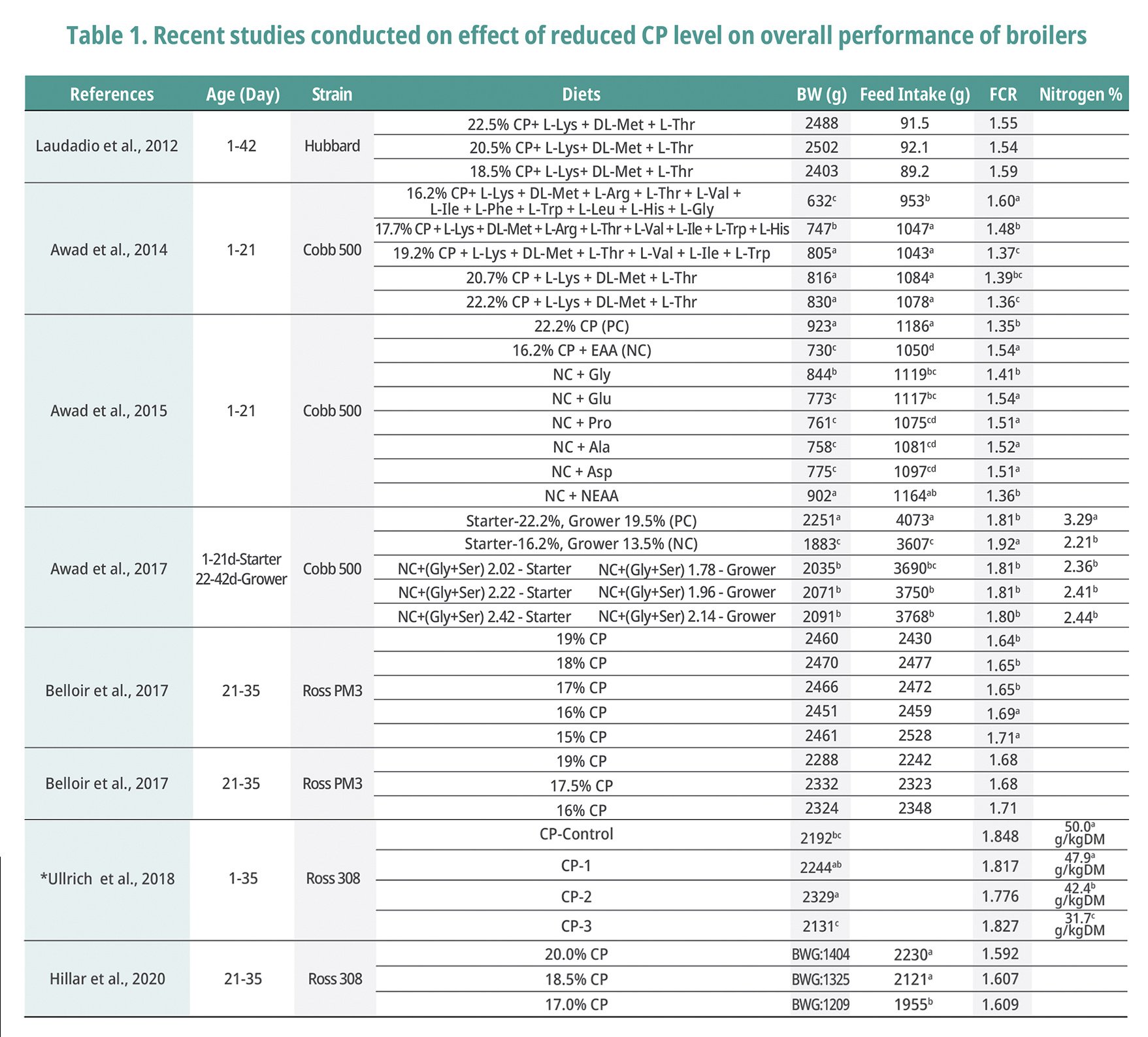Reducing the crude protein content in broiler diet and its impingement
2020.08.25

Abstract
Protein is a vital nutrient for poultry which plays a significant role in growth, egg production, immunity, adaptation to the environment, and in many other biological functions which are attributed to specific amino acids. Poultry diets with lower crude protein have generated global interest from the industry due to its impact on lowering feed costs, improving feed utilization, reducing environmental impacts, and minimizing health and welfare concerns. This article highlights the literatures regarding the effect of low crude protein in broiler industry and its overall impact on the performance, health, environment and welfare. According to the studies, there is room for further reduction in crude protein level with the balanced amino acid nutrition with the special emphasis on the non-essential amino acids i.e. glycine and branched chain amino acids and with the addition of suitable feed additives. Reducing protein levels can also address to the incidence of foot pad dermatitis and necrotic enteritis in broilers while reducing the nitrogen excretion. The concerned field requires further literatures to enable nutritionists for successful integration of synthetic amino acid with the low protein levels in poultry industry with the proper knowledge on the nutrient requirements, their interactions, its impact on environment and the feasibility to optimize the feed cost.
Background
The concept of reduced protein emerged at global level due to competition for feed ingredients among human and animals leading to rise in the cost, health and welfare concerns among consumers as well as the environmental impact of poultry industry in relation to the nitrogen emission. Agricultural and animal production sectors are major contributors to the nitrogen emission. The shift towards lower protein has been a gradual process of evolution and the history goes back to the early 1990s. The reduction in the crude protein level is feasible because of the availability of synthetic amino acids (AAs) such as methionine (Met), lysine (Lys), threonine (Thr), tryptophan (Trp), valine (Val), arginine (Arg), isoleucine (Ile) and glycine (Gly). Using supplemental AA to meet the requirements to achieve the desired production performance thereby reducing crude protein (CP) is possible today, and as a result, the need for intact protein sources such as soybean meal can be reduced.
This review is a compilation of data on the recent studies conducted on the effect of reduced crude protein diet in broilers and its overall impact. The aim of this document is to gauge the current knowledge on the effects of low CP diets fed in broilers, and to highlight the use of synthetic amino acid in low CP balanced diets. This can be a tool to optimize feed costs while maintaining the production performance of birds and simultaneously reducing the excretion of nitrogen. This adds to the further scope of synthetic amino acid addition in poultry diet. There is still limited use of synthetic AAs due to the limited knowledge regarding the nutrient content of feed ingredients and the specific requirement of a particular species at different age and environmental conditions. Nutritionists come into role to formulate rations more precisely to meet the animals AA needs, as well as providing a flexibility in raw material selection adding profit to the producers.
Reduced protein in broilers
Despite the large body of scientific literatures available showing the positive effects of low protein diets in broilers, still there is a scope of improvement in this field due to the misconception of decrease in performance with the reduction in protein level among producers. The current literatures (2010-2020) collected in Table 1 depicts the comparison of reduced protein diet supplemented with synthetic amino acids with the standard one in broilers. With the decreasing crude protein level, protein efficiency ratio (PER) linearly increase in poultry diet (Cheng et al., 1997). This leads to lower feed cost in low-protein diet but the drawback to this approach is the strong negative effects on weight gain and feed conversion ratio. Many nutritionists attempted to overcome this problem by fortification with amino acids (AA) during the last 3 decades which may result in a better economic return for the industry and lessen environmental pollution (Pesti, 2009). However, only a narrow margin of CP may be reduced by essential amino acids (EAA) fortification (Awad et al., 2014). The possible reason can be the insufficiency of nitrogen supply for non-essential amino acids (NEAA) synthesis. As steps are taken to reduce crude protein, it is becoming appropriate to consider the supply of non-essential amino acids that we have taken for granted as being supplied in sufficient quantity with the allegedly surplus protein. Accordingly, several studies have been carried out to investigate the effect of NEAA supplementation in low-CP, EAA-fortified diets (Dean et al., 2006) and revealed that when low-CP diet is supplemented with a mixture of NEAA, it enhanced the growth performance of birds. Again, similar improvement was reported when the low-CP diet was fortified with only glycine in the broiler studies conducted by Dean et al. (2006) and Ospina-Rojas et al. (2014). The importance of considering glycine and serine in low protein diets was discussed by Siegert and Rodehutscord (2015), where the proteins in the chicken body incorporating both glycine and serine and the metabolic processes requiring adequate supplies of these amino acids are highlighted. Nutritionists should again consider the importance of individual amino acids and their role in maintaining gut health when there is restricted use of antibiotic growth promoters. In particular, mucin production is of relevance because it aids in protecting the gut mucosa and is dependent upon adequate glycine and serine levels. Siegert and Rodehutscord (2015) emphasized the importance of interrelationships between essential and non-essential amino acids and the need to consider increasing proportions of, for example, threonine as a precursor for the synthesis of glycine. It is also pointed out that, as commercial nutritionists are tempted to use higher levels of DL-methionine to maintain ideal protein profiles, there is the factor of the role of glycine in the conversion of methionine to cysteine and in diets with low cysteine the requirement for glycine may be increased. The conclusion drawn is that, with dietary protein concentrations below 20%, glycine and serine will become limiting and that a glycine equivalent value will be required for diet formulation as an indicator of future direction for feed formulation. Ospina-Rojas et al. (2013) recommended 2.08% total Gly+Ser in a low-CP diet (19% CP) for male broilers from 0 to 3 weeks of age. Awad et al. (2015) showed that providing a level of 2.03% total Gly+Ser to a 16.2% CP diet failed to support optimal growth performance in male broiler chicks kept under tropical climate. Beside the environmental factor, two more possibilities may explain the inconsistency between results. The first is the possibility of higher Gly + Ser requirements under tropical climate. The high environmental temperature may profoundly affect the AA requirements of broilers (Balnave, 2004) through a reduction in AA digestibility (Soleimani et al., 2010). Secondly the use of male broiler chicks in (Awad et al., 2015) might be the reason for not achieving a standard growth performance. According to Baker (2003), male broilers are estimated to have higher AA requirements than females. In this regard, literature by Hernandez et al. (2012) revealed by adopting a low-CP 4-phase feeding program, adverse effect on the performance of male broilers but not females.

Impact on health, welfare, and environment
The source and level of dietary protein affect the intestinal Campylobacter perfringens populations with high or excess protein associated with greater incidence of necrotic enteritis or bacterial imbalance leading to enteritis and hence wet litter (Drew et al., 2004). It was estimated that 1% excess protein increases water intake by 3% in broilers by Larbier and Leclercq (1994). Wet litter causes higher incidence of pododermatitis, hence the avoidance of any increase in water use is regarded as essential. Dietary protein content is also correlated with water consumption and excretion (Alleman and Leclercq, 1997), and higher dietary CP levels has shown to increase the incidence of wet litter in poultry. Higher water consumption may result from the sodium dependent AA transporters drawing water across the lumen with greater AA absorption. Wet litter occurs as a result of increased water excretion and water spillage from more frequent visits to the water lines. Wet litter is known to cause dermatological diseases such as foot pad dermatitis and cellulitis. Skin infections are the main causes of carcass and chicken paw downgrade, reducing the yield of the meat chicken industry (US Poultry & Egg Export Council, 2009). Undigested protein that exits the small intestine acts as a substrate for the bacterium Clostridium perfringens in the hindgut, a pathogenic bacterium responsible for necrotic enteritis (Drew et al., 2004). The higher N waste levels (Ferguson et al., 1998), odorants (Sharma et al., 2017) and wet litter (Wheeler and James, 1949) that are associated with higher CP diet, creates an optimal environment for disease and infection. With the decreasing level of protein, these effects are reduced (Belloir et al., 2017), risk of diseases are lowered and animal welfare is improved. With the restriction of antibiotic growth promoters in poultry diets, the risk of necrotic enteritis and other related intestinal diseases will increase where any disease preventative measures, including reduction of dietary CP hold importance.
Excess CP can overload the gastrointestinal tract (GIT) with excessive AA, peptides and undigested protein (Apajalahti and Vienola, 2016). This can hamper feed efficiency, contributes to health and welfare issues and adds to negative environmental impacts. Excess AA presented in the diet are absorbed and catabolized, producing higher levels of N excretion in the form of uric acid (Wu, 2013). Nitrogen wastes have become a focus of environmental sustainability due to their impact on waterway pollution and ecosystems. Reducing dietary CP further promotes the sustainability and marketability of the poultry industry. Improving industry sustainability with low protein (LP) diets comes from reduced water intake and N excretion (Belloir et al., 2017). Decreasing industry dependence on dietary CP improves the health and welfare of meat type chickens by improving living conditions as well as feed utilization. The health benefits of LP diets must also be considered with future regulations on antibiotic growth promoter use. To remain an efficient and sustainable production system, the industry must consider concepts such as LP diets. Due to the direct relationship between dietary protein level and N excretion, the logical solution to excessive excreta N is to reduce protein content in the diet (Lopez and Leeson, 1995).
Conclusion
With a better understanding of specific nutrient requirements along with the possible interactions and other influencing factors, addition of adequate amino acids make it possible to drastically reduce dietary crude protein (CP) in poultry without compromising the profit level. In addition, the increasing availability of feed grade amino acids (i.e. L-tryptophan, L-valine, L-arginine, L-isoleucine, and L-histidine) allow the further decrease of dietary CP and changed the way of addressing risk management in feeds for monogastric animals which can further address to the successful adoption of antibiotic free animal production and thus reducing predisposing factors to disease. However, extensive studies regarding the successful inclusion of low protein diets is required to make their extension practical, profitable and worthwhile for the global poultry industry. The extension of LP diets in the poultry industry promotes a decrease in feed costs, environmental, health and welfare issues and an increase in N utilization. These benefits will result in an improvement in environmental sustainability and marketability in the industry.























